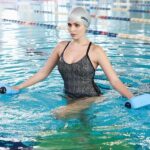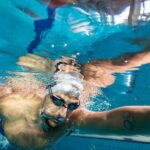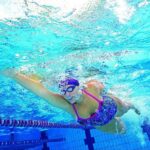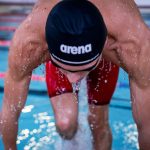Warning: swimming is seriously good for your health!
Discover the benefits of swimming for your brain!
That is what all swimmers ought to know, so if you do not swim get started right now!
As well as the physical benefits you will feel from swimming, it will also improve your mental health and brain capacity.
THE EFFECTS ON OUR BRAIN
To begin with, I suggest swimming at least 40 minutes three times a week to activate the brain circuits you will reutilise for learning purposes or just for performing all the various “dryland” activities to the best of your ability.
Sport – and swimming in particular – will make you smarter: it will develop different areas of your brain, thereby improving, for example, your coordination and proprioceptive skills.
It will also have an indirect effect on your cognitive functions and help control your emotions.
IN GREATER DETAIL
1. Less stress.
Swimming will increase the norepinephrine and noradrenalin levels in your brain, a hormone that affects your circadian rhythms, such as sleep and wakefulness.
This will help you react positively to psychophysically stressful situations, lowering your cortisone levels, the hormone that controls this annoying emotional state.
2. Memory boost.
The increasing blood flow deriving from the aerobic activity you will perform when swimming will increase oxygenation and, with it, your concentration.
All this will help create new cells that will improve your mnemonic skills and learning capacity.
3. I feel good.
Lap after lap, without you knowing it, your brain will stimulate and reinforce an area known as the frontostriatal circuit.
This extremely important area will help boost your confidence, thanks to an increase in the production of neurotransmitters.
4. Alzheimer’s and Parkinson’s? No, thanks.
The presence of new neurotransmitters will stimulate your memory in the hippocampus, an area of the brain located in the temporal lobe.
This will protect you against neurodegenerative diseases like Parkinson’s and Alzheimer’s.
5. Prevention is better than a cure.
Immersed in the water, your body will use lots of muscles, triggering off a sort of therapy against any kind of anxiety.
The production of serotonin, dopamine and endorphin while swimming will reduce the stress and anxiety in your head.
It has been proven that regular physical exercise works more effectively than ordinary antidepressants.
So, stop making excuses, particularly after a horrendous day in the office: pick up your bag and dive in the pool without thinking about it.
My advice is to get organised, taking everything you need with you in the morning: going home and switching on the TV might “glue you” to the sofa.
6.Sex.
Yes, it really is true!
Aerobic activity like swimming guarantees proper blood flow throughout your body. It will make you feel more confident in your private life and improve your sexual performance and desire.
If you are a man and want to improve your erectile function, get to the pool and start training!
Take a nice hot shower, get a good night’s sleep and be ready for the next article.
—————
Bibliography
Neurology, anatomy and psychology; preventive and adaptive motor sciences; Pavia University: faculty of medicine and surgery.
“How bad do you want it? Mastering the psychology of mind over muscle.”; Matt Fitzgerald.
“Perché Icaro voli. Psicologia dello sport.”; Sofia Tavella.
Written by:
Marco Borreca
Marco Borreca was born in Milan in 1985. After his competitive swimming career, he continued his sports studies graduating from the faculty of Preventive and Adaptive Motor Sciences in Pavia. He has been working as a swimming/ fitness instructor and rehabilitation expert at various sports centres since he was very young. He mainly focuses on using water for recovering motor skills in the case of sports injuries and disabilities. He currently works for a municipal sports centre as the Head of Fitness and also works for a private practice as a kinesiologist.







